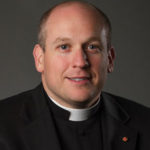
Fr. Christopher House
The colors of fall seem to have exploded this past week, but the beauty of creation in autumn is also a harbinger of the coming of winter when much of creation will enter into its deep sleep. While the winter may be cold and dark, we know that light and warmth will return again as springtime will call creation back into new life, yet we still must face the winter. The same is true in our lives as this earthly life must come to an end. We must be mindful of that reality. As we continue through the month of November, the month of All Souls, it is good for us to be reminded of what the Church terms the Four Last Things: death, judgement, hell, and heaven.
They say that there are two unavoidable realities in life: death and taxes. That statement is only half true. You can avoid taxes, I don’t advise it, but people do try and some are successful. Some people try to avoid death but no one has succeeded there. Life is the time and opportunity for us to accept God’s grace and to cooperate with it. While death is perceived as the natural course of life, death is also seen from a religious perspective as an aberration, as a consequence of sin. A disciple should be able to see a distinction between death and Christian death. The notion of Christian death points to the underlying belief that death is nothing more than a doorway to a new and greater life with God in Christ.
This year on the Solemnity of Christ the King (two weeks from now) we will hear the Gospel of the Last Judgement proclaimed to us at Mass. While the Scriptures speak of this general judgement the Church also speaks of particular judgement that all of us will face at the moment of death. Our own innate sense of justice moves us to believe that there must be some final reckoning concerning what good, or lack thereof, that we did in our earthly life. This judgement is not so much about God rendering a decision regarding us but rather fulfilling the choice we made by how we lived, as St. Paul teaches us “for we must all appear before the judgement seat of Christ, so that each one may receive recompense, according to what he did in the body, whether good or evil” (2 Cor 5:10). From this judgement, we then enter into one of two destinies: eternal life or eternal damnation.
For those who live and die in God’s friendship, they can be assured of everlasting life with him in heaven. This eternal destiny may be entered into immediately for those who die without any attachment to sin or after a period of purification for those who die, not in mortal sin but, with an attachment to venial sin. This process of purging is known as purgatory. Every soul in purgatory is destined for union with God in heaven. The pain of purgatory is not an intentional punishment inflicted by God but rather it is the result of the pain of separation experienced by the soul until it achieves perfect union with God.
For those who die in a state of mortal sin, having made a clear, manifested choice against God, the Church teaches that those souls suffer the eternal torments of hell. The suffering of hell is not one of fire and brimstone, but one of complete and everlasting separation from God, having full knowledge of what has been lost. The Church teaches that hell does indeed exist, as the Lord Jesus warns us of in the Scriptures, but the Church does not formally teach that anyone is there except the devil and hi fallen angels.
Death and judgement are realities that all of us must one day face, but for those who strive daily to live in God’s friendship, sinners though we are, we have nothing to fear for we have a loving and merciful God. Let us keep our hearts open to that love and mercy every day.